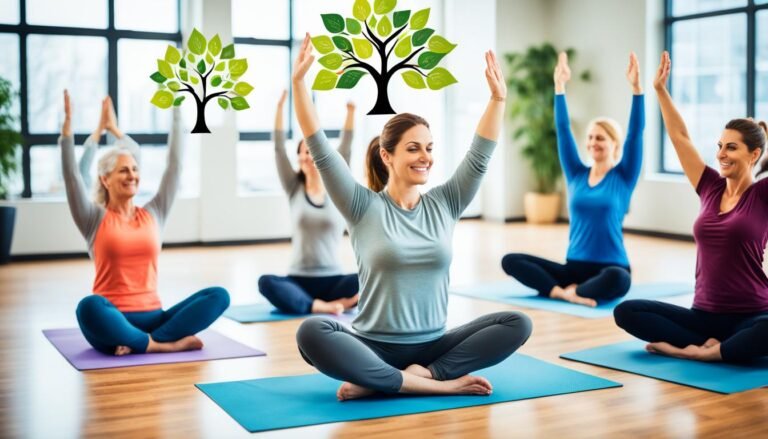Holistic Approaches to Mental Wellbeing for the Irish Community
At University College Dublin, early mornings find students practicing Tai Chi. They’re led by local mindfulness coaches on the green. This is part of a bigger movement in Ireland’s universities – a push for complete mental health care. Since 2020, the Higher Education Authority (HEA) has provided €20.9 million for student mental health. This shows a strong focus on full wellbeing.
This investment shows the high value put on treating mental, emotional, and physical health together. Working with the Department of Health, HEA is introducing the Healthy Campus Charter. This plan is about making places where students and staff can flourish in health.
On top of this, we look ahead to the International Health Promoting Campuses Conference in 2025. It’s happening thanks to the University of Limerick and ATU. The event will share more than 25 stories of Health Campuses. This will give us all a chance to learn about the best ways to boost mental health, focusing on understanding and caring about each other.
The holistic mental health movement in Ireland mixes new and old methods. Concepts like personal recovery were introduced as a part of the national Sharing the Vision in 2006. This evolved to the recent efforts shown by the Healthy Campus Charter. Though not without hurdles, the focus on community care stays strong. Ireland is working hard to keep mental health improvement a top priority.
Key Takeaways
- €20.9 million allocated by HEA for student mental health support since 2020.
- Over 25 Healthy Campus Case Studies to be showcased at the 2025 International Health Promoting Campuses Conference.
- The Healthy Campus Charter and Framework aim to foster holistic mental health and wellbeing in educational institutions.
- Challenges exist, but continuous efforts are made to integrate holistic wellbeing strategies in Irish mental health services.
- Community-based wellbeing practices are crucial for nurturing mental health in Ireland.
Mindfulness Techniques for Mental Wellbeing
Mindfulness helps by focusing on what we see, hear, and feel. It also involves controlled breathing. This reduces our stress. It allows us to take a break from our busy lives.
Engaging the Senses
Paying attention to our senses is key in mindfulness. By noticing shapes, colors, and sounds, awareness grows. This makes it easier to stay in the present. With time, it becomes a natural way to support our mental health.
Noticing details without judgment makes us appreciate life more. The World Health Organization says depression and anxiety cost a lot in lost work. But, focusing on our senses helps fight these issues.
Breathing Exercises
Controlled breathing is important in mindfulness. It can boost attention and lower stress. The Journal of Occupational Health Psychology shows a link between stress and health problems. Breathing exercises can help reduce these risks.
The “Awaken” program is famous for reducing stress through mindfulness. Just five minutes of mindful breathing a day can help. It’s great for stress. These activities boost our health and work productivity.
Mindfulness in Ireland, through sensory exploration and breathing exercises, can lead to a happier life. These simple, yet powerful, methods improve mental health.
The Role of Traditional Irish Remedies
Traditional Irish remedies are key in promoting natural health. These methods date back for many years but still fit well with today’s treatments. The knowledge and practices of healers in Ireland have always had a big impact on health. They offer solutions for problems like arthritis, warts, and skin cancer.
Herbal Treatments
Herbs have been important in Irish health since the time of the Druids. People have used plants like chamomile, yarrow, and thyme to cure sickness for centuries. Stories about healers and their herbs have been passed down for generations. Using herbs is a big part of how the Irish keep healthy, both then and now.
Ireland now sees a new interest in these old medical ways. For example, in Bailieborough Library, they keep a special folder with healers’ details for anyone who needs help. This shows how much Irish people value their traditional medicines. Documenting these practices also helps keep Irish heritage alive.
Aromatherapy
Aromatherapy is another key area for Irish natural health. By using the scents of local plants, it improves both the mind and body. It helps with stress, sleep, and keeping emotions in balance. These techniques date back to the Celts and are still a big part of modern natural health.
Aromatherapy doesn’t just help. It also connects the past with the present. Knowing these practices are real and true makes them fit right in with today’s health approaches.
Spiritual Healing Practices in Ireland
Ireland’s spiritual healing practices have a long history. They started with Celtic rituals and continue in today’s methods. Traditional and modern ways both help Irish people feel mentally well. These practices create a full picture of healing in Ireland.
Traditional Celtic Rituals
In Ireland, traditional Celtic rituals are a key part of its past. They focus on nature and life’s patterns. These rituals include special ceremonies and practices that connect people to the spiritual world. Nature plays a big role, helping to lower stress and increase happiness.
Celtic shamanism, a new trend in Irish healing, highlights these old rituals. It gets people together to share spiritual practices. This connects them deeply to each other and the spiritual world.
Modern Spiritual Practices
Today, spiritual practices in Ireland mix old wisdom with new ideas. The Healing Spirit Festival, run by Gearoid Teevan, is a good example. It offers workshops for healing and brings people together. Plus, it’s a fun and safe place for everyone.
Events like “WellFest” and the “Dublin Mind Body Experience” focus on growing community and personal growth. They have classes in mindfulness, meditation, and sound therapy. This shows a wide range of modern spirituality in Ireland.
Retreats at places like Dzogchen Beara and Burren Yoga focus on being eco-friendly and well. They teach self-care, Reiki, and herbal medicine. These events provide a space for people to work on their healing.
So, Ireland’s healing ways blend old Celtic rituals with new spiritual practices. This mix gives a complete path to mental and spiritual health. It shows the deep cultural and spiritual history of Ireland.
The Importance of Community Support Networks
Community support networks are crucial for mental wellbeing in Ireland. They create social bonds that reduce stress and loneliness. A robust network in Ireland helps people feel they belong and boosts the whole community’s wellbeing.
In 2019, 81% of people aged 15-24 and 75% over 75 had more than two reliable friends. This strong support helps everyone face life’s challenges better. It is a vital part of our mental health as a community.
Community support in Ireland helps overcome barriers to mental healthcare. Those like migrants might face language issues. The specific support they get helps fill these gaps, aiding both practically and emotionally in their wellbeing.
“Strong community connections are essential for an individual’s mental health, promoting not only emotional support but also practical help.”
Life satisfaction in Ireland has been on the rise. In 2018, 44% of those 16+ felt their life was very satisfying. This was higher than the EU average of 25%. It shows how community support greatly affects our overall happiness.
With more people working, there’s a higher need for supportive networks. These groups must adapt and grow to meet new challenges. By expanding their services, they can help more people positively impact Ireland’s mental health.
Integrative Therapies Combining Modern and Traditional Practices
Integrative therapies in Ireland are growing fast, mixing new and old treatments for better care. This method focuses on stopping health problems before they start. The Integrative Medicine Clinic has many services for the body and mind.
Complementary Therapies
Integrative therapies use many complementary practices like acupuncture and herbal medicine. Their goal is to make you feel better and help you relax. These therapies aim to improve your mental and emotional health.
At the clinic, functional medicine looks at your health from the inside. It uses your health history and tests to find the root of your health issues. The clinic also has personalized pain treatments to help improve your life quality. They also help people quit smoking in a special way.
Nutritional Support
Food is key in these therapies, mixing traditional Western medicine with new ideas. They offer detox programs to help cleanse your body. You can see a GP online and get advice quickly. Plus, they have PRP facials to help your skin look its best.
Effective Stress Management Strategies
Learning to manage stress is key to overall health. Only 37% of people feel they control their stress well. Adding exercise and relaxation into your routine can make a big difference. They help lower your stress and keep you mentally strong.
Exercise and Physical Activity
Doing regular exercise is great for your body and your mind. It makes you happy by releasing endorphins. This can replace unhealthy habits that 65% of people turn to.
Activities like running or swimming help physically and mentally. They release stress, balance your life, and boost your health.
Relaxation Techniques
Relaxing is as important as staying active to deal with stress. Many turn to bad habits or too much sleep to cope. But there are better ways like deep breathing, mindfulness, or meditation.
These can reduce anxiety and bring peace to your mind. Adding things like hobbies, music, or reading to your everyday life can also help a lot.
It’s important to find good stress techniques in our busy world. By using exercise and relaxation, you can change how you deal with stress. This can lead to a happier life.
Culturally Inclusive Counseling for the Irish Community
Culturally inclusive counseling respects the unique Irish culture. It ensures mental health services meet the community’s specific needs. By using traditional beliefs and practices, it makes support more helpful in Ireland.
Understanding Cultural Context
There is more demand for mental health services that recognize culture. In Ireland, counseling is made to honor traditional values. For example, Talk Therapy Dublin offers therapy by culturally aware therapists.
Ravind Jeawon MIACP leads Multicultural Orientation (MCO) training. This training is for places like Dublin City University and the Health Service Executive (HSE). It teaches about migration, racism, and how to supervise in a culturally responsive way.
The MCO training includes lessons on various backgrounds such as race, gender, and wealth. It teaches a model focused on learning from cultures and being open and understanding. The training uses group activities and reflections for the best learning experience.
Being sensitive to culture in counseling can stop people from quitting too early. Many people from different races leave after just one session. Educating them about what to expect from counseling can keep them in treatment longer. This makes mental health care more welcoming for all in Ireland.
Embracing Ancestral Wisdom for Holistic Wellbeing
Ancestral wisdom is key for the Irish in achieving holistic wellbeing. It offers timeless teachings for our mental and emotional health. These teachings hold a powerful influence over us.
Healing through storytelling is a potent use of this wisdom. It’s not just about keeping our heritage alive. Storytelling also helps us deal with tough times and bounce back stronger.
Storytelling as a Healing Tool
Storytelling has always been loved in Ireland. Greats like Colum Stapleton and Melanie Lynch have shown its power. They help us turn our own stories and those of our community into lessons of understanding and strength.
Dr. MacGabhann points out how telling stories can help with mental health. In his book, he shows how ancient advice can tackle modern-day struggles.
The Celtic Druids used stories to teach and heal too. Their tales weren’t just for fun. They were guides for growing stronger as a community, even across generations.
Now, modern thinkers like Ruairi McKiernan and Danu Forest are carrying on this tradition. They’re using ancient storytelling for making resilient communities. This shows how powerful these old practices still are today.
Taking in our ancestors’ wisdom through storytelling helps us link with the past. It strengthens us for what’s ahead. This is how crucial these old stories and their lessons are for our wellbeing.
Resilience-Building Programs and Their Impact
Irish community programs focused on building resilience have greatly improved mental health. They’re not just helpful; they’re vital for full personal growth and creating strong communities.
Community Initiatives
The ‘Building Resilience for Life’ program is a standout. Between October and December 2023, 38 people took part. An amazing 81% found it ‘Very Good’ or ‘Excellent’.
These initiatives help people connect, feel better about themselves, and learn to deal with tough times. Programs like ‘Autumn Wellbeing’ and ‘Chill and Crafts’ have made a real difference in many people’s lives.
Feedback shows that participants felt closer to the tutors and better at managing stress. Staff said the center had a better vibe and that everyone felt like they belonged more. These programs also got people more involved in the community and more willing to stand up for what they need.
Personal Development Workshops
Workshops for personal growth are key to the success of these efforts. ‘Chill and Crafts’ reduced loneliness, provided ways to relax, and taught how to handle stress. They also encouraged people to talk about their mental health, things some had not done in a while. Service users loved these activities after not getting as much variety for a long time.
By combining community activities and personal development workshops, Irish community programs have done a lot for mental health. Both the participants and the tutors highlight the importance of these programs in making a positive difference.
Conclusion
The Irish push for holistic well-being is a complex journey. It ties together mindfulness, spiritual healing, and local remedies. Also, it leans heavily on strong community support networks. Many experts in medicine, psychology, and social work now champion this broad view of health.
This comprehensive view, known as a biopsychosocial perspective, looks at mental health through many lenses. It values both tradition and modern science. This holistic view aims for recovery that is both caring and complete.
Though the idea of recovery in mental health started in the 1980s, it is still hard to define. There are different types of recovery seen by experts: clinical, functional, and personal. Turning these ideas into action is tough. It points to a big need for changes in how we think, our culture, and how services are set up.
Improving Irish well-being means blending traditional and new approaches. It focuses on community-based mental health projects. This way, it honours Ireland’s culture and custom. The goal is to keep building on these mixed strategies. This will make sure Ireland’s mental health services are open, relevant, and work well. It would be a turning point for well-being in Ireland, setting a high standard.
FAQ
What are some holistic approaches to mental wellbeing within the Irish community?
How can mindfulness techniques help with mental wellbeing?
What are some traditional Irish remedies for mental health?
How do spiritual healing practices contribute to mental wellbeing in Ireland?
What is the importance of community support networks?
How do integrative therapies combine modern and traditional practices?
What are some effective stress management strategies?
How does culturally inclusive counseling benefit the Irish community?
How can ancestral wisdom be utilized for holistic wellbeing?
What impact do resilience-building programs have on mental wellbeing?
Source Links
- A Whole of Institution Approach to Health and Wellbeing | Higher Education Authority
- Exploring the Evidence for the Paradigms of Recovery and Social Work Converging in Mental Health Service Delivery Worldwide: Reflections from an Irish Case Study
- Rethink Ireland: Sports and Wellness Fund 2024
- The Holistic Path to Mental Health
- Mental Health and Self-Care Program: Nurturing Well-being through Holistic Approaches in Ireland
- Holistic Approach in Mental Health – Ripple Ranch Recovery
- Indigenous Narratives of Health: (Re)Placing Folk-Medicine within Irish Health Histories
- Ancient Irish Healing – Integrated Health Advisor
- Irish Healing Practices –
- Ancient Irish Meditation Practices: Insights and Techniques
- Ireland’s Best Therapy Festivals – Heal & Connect | Ireland, UK Healing Spirit Festival
- Mad in Ireland: Fields of Healing on Apple Podcasts
- Wellbeing for Ireland – Making a Paradigm Shift | Social Justice Ireland
- Interventions to improve the mental health or mental well-being of migrants and ethnic minority groups in Europe: A scoping review
- Exploring the Evidence for the Paradigms of Recovery and Social Work Converging in Mental Health Service Delivery Worldwide: Reflections from an Irish Case Study
- Integrative Medicine Clinic in Dublin – Dr.Tobias Pintar
- Explained: Holistic vs Modern Western Medicine – Global Autoimmune Institute
- Mental illness and complementary / alternative treatments
- Stress Management: Techniques & Strategies to Deal with Stress
- How to manage and reduce stress
- Stress: Strategies for Success
- Multicultural Counselling Service
- Culturally Responsive Evaluation and Treatment Planning – Improving Cultural Competence
- Clinical Mental Health Counseling Degree Programs | UWS
- Irish Holistic Wisdom : Ó Nualláin, Fiann: Amazon.sg: Books
- Celtic Wisdom Talks Podcast – Sli An Chroi
- The Importance of Nature Connection in Celtic Culture: Exploring Animism and Celtic Beliefs — An Darach Forest Therapy
- ‘Building Resilience for Life’ Programme for Mental Health Service Users in Galway City – Healthy Ireland Local Government
- Self-Compassion in Irish Social Work Students: Relationships between Resilience, Engagement and Motivation
- Building health system resilience through policy development in response to COVID-19 in Ireland: From shock to reform
- Exploring the Concept of Recovery in Irish Mental Health Services: A Case Study of Perspectives within an Inter-Professional Team
- Mental Health and Urology: A Holistic Approach*
- Preparing society for climate risks in Europe – lessons and inspiration from Climate-ADAPT case studies








